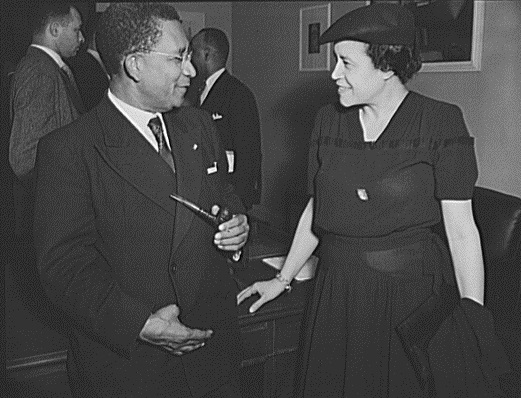“Only the Black woman can say when and where I enter, in the quiet undisputed dignity of my womanhood, without violence, and without suing or special patronage, then and there the whole Negro race enters with me.” — Anna Julia Cooper, 1858-1964
I recently attended an event to encourage more women to run for public office.
The event was inspiring, encouraging, and informative. But what I learned most that day wasn’t during the meeting. Instead, it was during a conversation I had after the meeting with a gentleman from the Crystal Bird Fauset Institute for Civic Engagement.
He was chatting up support to have the U.S. Postal Service recognize Fauset’s accomplishments on a commemorative postage stamp. I was embarrassed for not having ever heard of her — even though she represented a legislative district in the same West Philadelphia neighborhood where I grew up.
A historical marker at 54th and Vine streets designates the spot where she lived in West Philadelphia.
An international traveler and lecturer for the American Friends Service Committee, she gave 200 speeches on race relations in a single year from September 1927 to September 1928.

Elected in 1938, Fauset was the first African American woman elected to a state legislature in the United States in a district that was, at the time, two thirds white. She only served for one year, resigning to serve in the Roosevelt Administration, but it was one heck of a year in which she introduced nine bills and three amendments on the health and welfare of the poor, housing, and women’s rights in the workplace.
It should come as no surprise that Philadelphia’s African-American women have such long and deep roots in political activism — much of it due to Fauset.
In the 1930s, she organized thousands of African-American women into political activism. She herself held a leadership role at the 1936 Democratic National Convention held in Philadelphia, too.
Among her many accomplishments, Fauset served President Franklin Roosevelt as a Civil Defense adviser on race relations, was instrumental in the development of the Swarthmore College Institute on Race Relations, and was a founder of what later became Philadelphia’s World Affairs Council.
She was truly dedicated to her belief in justice, too.
Despite her long ties to the Democratic Party, in 1944, unhappy with what she considered to be the slow pace of the Roosevelt Administration’s efforts to end segregation, she publicly backed Republican presidential nominee Thomas Dewey.
For me, Crystal Bird Fauset will always be associated with the forum entitled “Educate, Empower, Engage Women in the Political Process,” the event I was attending when I first learned of her.
It seems very appropriate that I would meet Fauset for the first time at such an occasion. She was the grand dame of educating, empowering, and engaging women in the political process.
Learning about Fauset reminded me of the powerful words of the African American feminist and scholar Anna Julia Cooper: “Only the Black woman can say when and where I enter, in the quiet undisputed dignity of my womanhood, without violence, and without suing or special patronage, then and there the whole Negro race enters with me.”
Have an idea for a program or event? Or, do you have a question or comment for the Philadelphia Commission for Women? Contact Executive Director Jovida Hill at jovida.hill@phila.gov!
